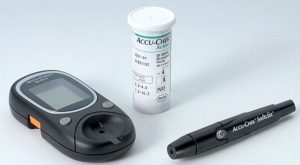
People living with diabetes must be involved in the management of their condition to be able to achieve good control of their blood sugar and prevent the numerous complications associated with disease.
This is the submission of Mrs Folashade Olufemi-Ajayi, the Acu-Chek Product Manager, Roche Products Limited at the Media Roundtable organized by NHO to mark the 2016 World Health Day.
In a presentation titled “Why is Structured Self-Monitoring of Blood Glucose (SMBG) so important?” Olufemi-Ajayi observed that Nigeria could beat diabetes, as advocated by the theme of the 2016 World Health Day, if people living with diabetes are encouraged to work together with their clinicians to achieve healthy lifestyle and good glycemic control.
This, according to her will involve a structured Self-Monitoring of Blood Glucose (SMBG) whereby patients are taught and encouraged to test their blood sugar regularly and adopt a lifestyle that will ensure a good control of their blood sugar.
She told the participants at the Media Roundtable that self-monitoring of blood sugar by patients will eventually result in patients taking their own health in their hands and not relying so much on health care professionals.
“It increases (patients’) motivation to keep blood glucose within target. Self-monitoring enables patients to achieve appropriate metabolic control, avoiding hypoglycemia and reducing the likelihood of developing long-term complications of hyperglycemia such as blindness or renal failure,” she submitted.
Olufemi-Ajayi however observed that patients are not testing often enough or “in a way that gives meaning to their results”
“People with Type 1 diabetes often need to make changes to their insulin regimen to get the right amount of insulin at the right time to meet their body’s needs. Structured SMBG is central to their day-to-day adjustment of insulin doses in relation to food and activity.
“People with Type 2 diabetes require a stepwise approach to therapy to help them address the underlying problems of insulin resistance and progressive insulin deficiency. Studies have demonstrated that there is significant variation in the contribution of fasting and postprandial glucose with increasing levels of HbA1c which can have an impact on choice of treatment. Structured SMBG can be used as a part of a patient education program to help them understand more about their condition, make the right lifestyle changes and inform the increasingly complex decisions regarding therapeutic intervention,” she further said.

Mrs Olufemi-Ajayi recommended the use of Accu-Chek blood glucose metre by patients for an effective self monitoring by people with diabetes.. According to her, Accu-Chek could help drive structured testing “ because we know its works.”
She disclosed that the metre ensures a pain-free testing procedure because it uses clixmotion technology. “It produces results in five seconds and can store up to 350 test results with digital display showing clear and large display of the readings.
“Due to the unique out-of-meter dosing option, the Accu-Chek Active meter is particularly suitable for multiple patient and assisted use,” she told the participants.
The World Health Organisation (WHO) in its first Global Report on diabetes launched on April 7 as part of activities marking the 2016 World Health Day, emphasized the need for an effective management of diabetes, saying people with the condition can live long and healthy lives if their diabetes is detected and well-managed.
“Good management using a standardized protocol can potentially prevent complications and premature death from diabetes using: a small set of generic medicines; interventions to promote healthy lifestyles; patient education to facilitate self-care; regular screening for early detection and treatment of complications through a multidisciplinary team.
“For those who are diagnosed with diabetes, a series of cost-effective interventions can improve their outcomes, regardless of what type of diabetes they may have. These interventions include blood glucose control, through a combination of diet, physical activity and, if necessary, medication; control of blood pressure and lipids to reduce cardiovascular risk and other complications; and regular screening for damage to the eyes, kidneys and feet, to facilitate early treatment. Diabetes management can be strengthened through the use of standards and protocols,” WHO said.

